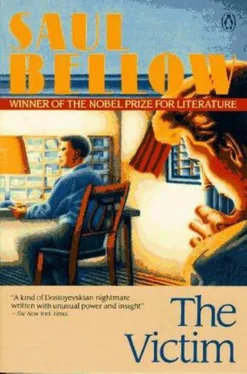Saul Bellow - The Victim
Здесь есть возможность читать онлайн «Saul Bellow - The Victim» весь текст электронной книги совершенно бесплатно (целиком полную версию без сокращений). В некоторых случаях можно слушать аудио, скачать через торрент в формате fb2 и присутствует краткое содержание. Год выпуска: 1988, Издательство: Penguin Books, Жанр: Современная проза, на английском языке. Описание произведения, (предисловие) а так же отзывы посетителей доступны на портале библиотеки ЛибКат.
- Название:The Victim
- Автор:
- Издательство:Penguin Books
- Жанр:
- Год:1988
- ISBN:нет данных
- Рейтинг книги:3 / 5. Голосов: 1
-
Избранное:Добавить в избранное
- Отзывы:
-
Ваша оценка:
- 60
- 1
- 2
- 3
- 4
- 5
The Victim: краткое содержание, описание и аннотация
Предлагаем к чтению аннотацию, описание, краткое содержание или предисловие (зависит от того, что написал сам автор книги «The Victim»). Если вы не нашли необходимую информацию о книге — напишите в комментариях, мы постараемся отыскать её.
The Victim — читать онлайн бесплатно полную книгу (весь текст) целиком
Ниже представлен текст книги, разбитый по страницам. Система сохранения места последней прочитанной страницы, позволяет с удобством читать онлайн бесплатно книгу «The Victim», без необходимости каждый раз заново искать на чём Вы остановились. Поставьте закладку, и сможете в любой момент перейти на страницу, на которой закончили чтение.
Интервал:
Закладка:
He went back to the parlor for a while. When he announced that he was leaving, Elena looked at him but did not say good night.
Philip, heavy eyed and dejected, sat outside the circle of adults, his arms wound around the back of the chair. His shirt was pulled out at the sides and his shoes untied.
“Tired from trotting after them all day,” Leventhal observed to himself. He was filled with tenderness toward him. “Go to sleep, Phil,” he said.
“I will.”
“Did you have a good time yesterday?”
“Yes, swell.”
“When the kid gets out we’ll take one of those boat excursions around the island. I understand they’re really beautiful.”
Philip laid his cheek on the top rung of the chair in a way that fatigue alone could not have explained. Leventhal passed his hand over his short hair, saying, “All right, boy.” But beyond that he could bring nothing out. He foundered, the thread of reassurance lost, the very breath with which to make reassurances driven out of him by his pity for the children. He hurried down the dirty tile stairs. A bus loomed up, half a block away, and he ran across the street. Though there were empty seats around him he stood up, supporting himself on the shining pole, hardly hearing the escape of air from the brakes and the pneumatic doors, and seeing only chaotically shapeless colors with his brimming eyes. Philip must have noticed him whispering to Villani. But probably he had begun to understand earlier. He knew, Leventhal was convinced. And perhaps even little Mickey in the hospital comprehended it all, after a fashion, affected as a candle flame is by varying amounts of air, as all that wants to be what it was made responds to whatever feeds or endangers it.
Looping and swerving the bus reached the waterfront. The smell of the harbor and the flash of the arcades came to Leventhal. He made his way through the dim space of the shed to the bow of the boat and looked out on the water, the sharp stars, and the crimson and yellow spots hung from the cranes and hulls swinging between the slip and the incandescent low crust of the shore.
13
THE week that followed was a miserable one for him. Dr Denisart was not optimistic on Monday, and, since he had proved before that he was anything but an alarmist, Leven-thal saw that in his professional way he was giving notice that there was very little hope. On Tuesday he said he thought it advisable that Max should come home. Leventhal cried into the phone, “What do you mean? Is this it?” The doctor answered, “The father ought to be on hand.” “It’s the showdown, in other words,” Leventhal said. He sent the wire, and that evening and the next he went out to the hospital, making every effort to avoid meeting Elena. Mickey was now unconscious, and they fed him intravenously. Hot and grimy after his long trip, Leventhal bent over the bed. The boy’s face was darkened with fever; the needle was taped to his arm with strips broad enough for a grown man. The level of the liquid in the flask held by a clamp on the long stand did not seem to change. Leventhal moved to the window and lifted the edge of the shade an inch or two with his forefinger, peering down at the stone jars of vines and geraniums, too massive for the small sunken court. Then he went out, with a hesitation at the foot of the bed. He traveled two hours in order to spend ten minutes in Mickey’s room.
He kept telling himself, “The showdown is coming” — guiltily, for at heart he had no hope. The word itself was an evasion, and he, not the doctor, had introduced it. But it was a comprehensive word; it embraced more than Mickey’s crisis, or Elena”s, or his own trouble with Allbee. These were included; what had been going on with Allbee, for example, could not be allowed to continue indefinitely. But what he meant by this preoccupying “showdown” was a crisis which would bring an end of his resistance to something he had no right to resist. Illness, madness, and death were forcing him to confront his fault. He had used every means, and principally indifference and neglect, to avoid acknowledging it and he still did not know what it was. But that was owing to the way he had arranged not to know. He had done a great deal to make things easier for himself, toning down, softening, looking aside. But the more he tried to subdue whatever it was that he resisted, the more it raged, and the moment was coming when his strength to resist would be at an end. He was nearly exhausted now.
It was nearly midnight when he came home on Wednesday. Even before he unlocked the door, he heard the refrigerator panting as though it were trying to keep up a charge of energy in the air of the empty flat. He turned on the lights in the front room and in the bathroom where he undressed and put on pajamas. Opening the medicine chest, he stared like someone who has forgotten what he is looking for; in reality, his mind was empty. His hand touched his razor and, unthinkingly, he changed the blade and set it back in the red velvet groove of the case. Barefooted he walked into the front room. There was paper on the desk, and it occurred to him to send a note to Mary. He sat down, twisting his legs around the legs of the chair, wrote a few words, and stopped to consider what he ought or ought not to say. There was plenty to choose from. That he missed her? That it was still hot? He put down the pen and leaned on the desk, pressing his chest against the edge of the leaf. Dumb and motionless in the silent room, he heard the slamming of car doors and the racing of motors outside. Suddenly there was a prolonged, tearing peal of the bell. A finger screwed the pusher mercilessly in the socket. Hurrying to the door he shouted, “Yes?” He heard his name pronounced several times and called back, “Who is it?” Stooping over the banister, he caught sight of Allbee on the landing below and he withdrew into the vestibule and shut the door. Presently the handle was turned, turned again quietly, and then shaken.
“Yes, yes, what do you want now? What do you want?” he said.
Allbee knocked. Leventhal jerked the door open and saw him with his knuckles raised, ready to knock again.
“Well?”
“I want to see you,” said Allbee.
“Well, you’re seeing me.” He made as if to close the door, and Allbee brought his head forward quickly in a movement of melancholy protest, looking at Leventhal without rancor, however.
“That isn’t fair,” he said. “I work up my courage to come and see you. It takes me nearly a day to do it.”
“To cook up something new.”
Allbee’s expression was serious. The insane element usually manifested in his smiles was absent.
“The other night-last week-I was getting around to something,” he said. “There was something I wanted to say to you.”
“I don’t want any more discussions. I won’t stand for any. Anyhow, it’s after midnight.”
“Yes, I know it’s late,” Allbee conceded. “But there was something important to say. We were sidetracked.”
“You were,” Leventhal said heavily. “I wasn’t even in it.”
“I guess I know what you’re referring to. But whatever I did say, I didn’t intend to be personal. You shouldn’t consider…”
“What? It was all theory, theoretical?” he said sarcastically.
“Well, partly. It was partly joking,” Allbee explained painfully. “That’s an ingrained habit with me. I know it’s bad.”
“I’m sorry, but I don’t understand you. Maybe I don’t understand Emerson either. It goes together.”
“Please…” he said despondently.
There was a hush in the hall under the dull spokes of the skylight and the filmy glass.
“You take it all in the wrong spirit,” he went on.
“How should I take it?”
Читать дальшеИнтервал:
Закладка:
Похожие книги на «The Victim»
Представляем Вашему вниманию похожие книги на «The Victim» списком для выбора. Мы отобрали схожую по названию и смыслу литературу в надежде предоставить читателям больше вариантов отыскать новые, интересные, ещё непрочитанные произведения.
Обсуждение, отзывы о книге «The Victim» и просто собственные мнения читателей. Оставьте ваши комментарии, напишите, что Вы думаете о произведении, его смысле или главных героях. Укажите что конкретно понравилось, а что нет, и почему Вы так считаете.











